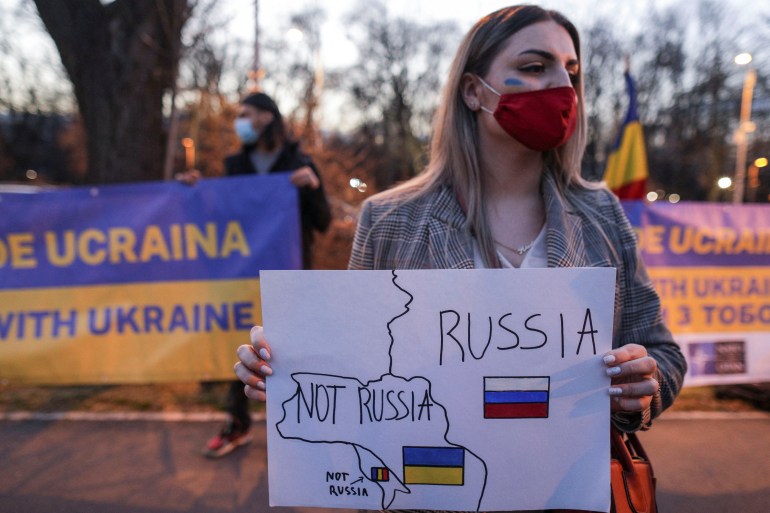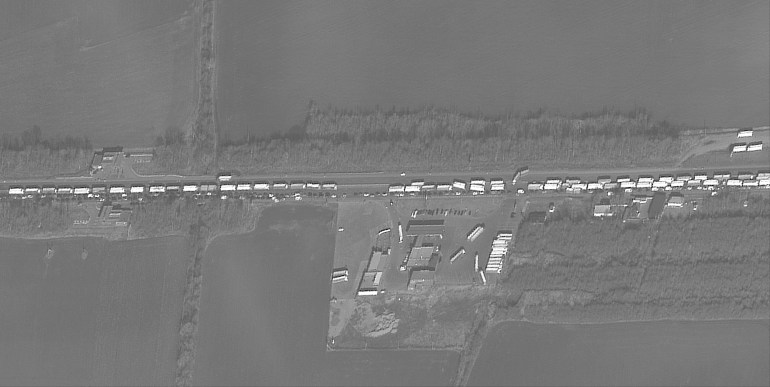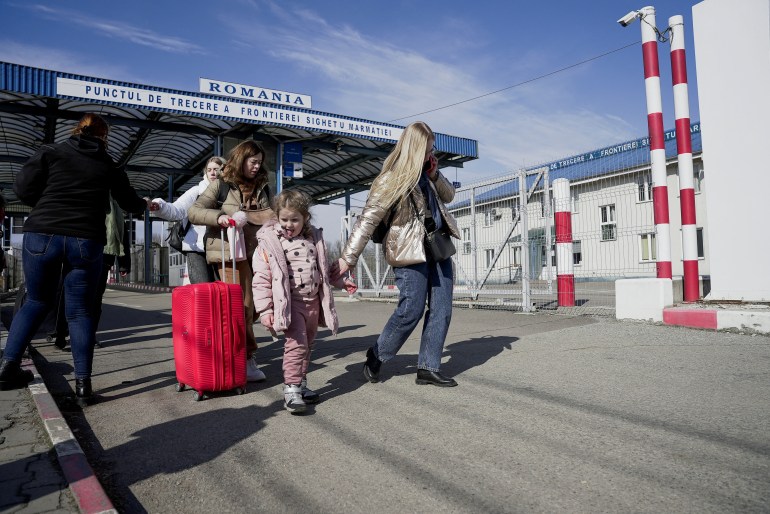Romania on edge as Russia invades Ukraine | Russia-Ukraine crisis News
Cluj-Napoca, Romania – “I assure you, no Romanian should fear for the safety of himself and his family,” Romanian President Klaus Iohannis said on Thursday, shortly after Russian troops launched a full-scale invasion of Ukraine – its biggest military deployment since World War II.
“Romania enjoys the widest possible security guarantees. Never in our history have we been better protected against any potential aggression. Romania will not be drawn into the military conflict in Ukraine,” said the Romanian leader.
In a TV address the same evening, Defence Minister Vasile Dancu said Romanians “are not in danger” and that they should not be worried because there “won’t be a military conflict between NATO and Russia”.
However, the assurances from the leadership of the country of 19 million people may have little effect in Romania, a NATO member since 2004, where many have been on edge since the Russian attack on Ukraine.
Romania’s fear is rooted in repeated Russian invasions over the centuries. The Russian-controlled territory of Transnistria in Moldova, just 100 miles (160km) from the Romanian border, is Moscow’s western-most garrison.
Romania pledged “unconditional political support” for Ukraine in the event of a Russian invasion and has provided Ukraine with cybersecurity backing.
 A protester holds a drawing of eastern Ukraine and Moldovan territories with ‘not Russia’ written on them during a protest outside the Ukrainian embassy in Romania [Inquam Photos/Octav Ganea via Reuters]
A protester holds a drawing of eastern Ukraine and Moldovan territories with ‘not Russia’ written on them during a protest outside the Ukrainian embassy in Romania [Inquam Photos/Octav Ganea via Reuters]As bombs began to fall in Ukraine early on Thursday morning, Bucharest-based student Valentin Lăzureanu woke up to a cascade of notifications on his phone announcing the Russian attack.
“When the news and pictures started coming in, I realised we didn’t have a dedicated space for it and everyone was getting their information from so many scattered sources,” the 24-year-old told Al Jazeera.
Lăzureanu created a Facebook group where people could share resources and verify information to help each other understand what was happening across the border.
Since then, young Romanians in the group – called War Room – have been discussing possible scenarios that could even engulf their country.
“How likely is it that they would invade Romania as well?” asked one in the group.
Romanian foreign policy analyst Oana Popescu-Zamfir told Al Jazeera that while a direct military conflict between Russia and Romania is unlikely, political, economic and social repercussions of the Ukraine invasion are “palpable”.
“There is a degradation of the regional security situation,” said Popescu-Zamfir. “This affects Romania economically because the entire region is perceived by investors as having a higher risk of investment.”
Popescu-Zamfir also noted that Romania, like much of Europe, is dependent on Russian gas. The conflict could trigger a spike in gas prices or complete interruption of gas flows into Romania.
 A satellite image shows a long traffic jam of vehicles leaving Ukraine, near Siret, Romania [Courtesy of Maxar Technologies/Handout via Reuters]
A satellite image shows a long traffic jam of vehicles leaving Ukraine, near Siret, Romania [Courtesy of Maxar Technologies/Handout via Reuters]Ukrainians seek asylum in Romania
Besides the economic effect, Romania has also received more than 10,000 Ukrainian asylum seekers at their northern and eastern borders since the Russian invasion.
Earlier this week, Defence Minister Dincu said Romania was capable of taking in half a million refugees.
However, according to Romanian media reports, no initiative has yet been taken to build camps for the Ukrainian asylum seekers.
That lack of government action has prompted many Romanians to form another Facebook group, United for Ukraine, where almost 50,000 people have offered to pay for Ukrainian asylum seekers’ flights or hotel expenses, or even provide them with places to sleep.
Ukraine also has a sizeable Romanian population of about 150,000 people, many of whom are expected to return to Romania in the coming days.
‘US will defend every centimetre of NATO’
When US President Joe Biden announced more sanctions against Russia on Thursday evening, he also committed to sending more troops to Romania, a strategic NATO partner in the region which hosts alliance bases and a key missile defence system.
“If he (Russian President Vladimir Putin) moves in NATO countries, we will get involved,” said Biden in his address, which was widely reported in Romania.
“The US will defend every centimetre of NATO,” said Biden.
In the leadup to the Russian invasion of Ukraine, Germany and France also sent weapons, troops and aircraft to Romania, which has been staunch in its support of the transatlantic alliance and its condemnation of Moscow’s actions in Ukraine.
But according to foreign policy expert Popescu-Zamfir, central and Eastern European countries have “repeatedly pointed out the danger of Russian aggression”.
Popescu-Zamfir believes the Black Sea, which Romania shares with Russia, Ukraine, Georgia and Turkey, remains “an extremely vulnerable area”.
“Romania, in particular, made efforts after the [2016] NATO summit in Warsaw when more importance was given to the Baltic countries and Poland, while we did not have any contingency plans for the Black Sea,” she told Al Jazeera.
Meanwhile, the Romanian media have been keeping a round-the-clock watch on the developments in Ukraine, also measuring how the invasion could affect their country.
“I am hopeful the West will respond to Russia’s aggression with unity,” said Lăzureanu.
 A woman holds her child’s hand as they arrive from Ukraine to Romania, at Sighetu Marmatiei border crossing near Baia Mare, Romania [Fedja Grulovic/Reuters]
A woman holds her child’s hand as they arrive from Ukraine to Romania, at Sighetu Marmatiei border crossing near Baia Mare, Romania [Fedja Grulovic/Reuters]‘Will they invade Moldova?’
Many in Romania are also worried about Moldova, a nation of 2.6 million people which has strong historical and linguistic ties with Romania but is not a part of NATO.
“In many ways, the Republic of Moldova is an extension of Romania,” Popescu-Zamfir told Al Jazeera.
“Will they invade Moldova as well?” asked one of the members of War Room, the Facebook page created by Lăzureanu.
Former Romanian President Traian Basescu even urged the government to do a “snap referendum” to unite Moldova and Romania to deter Russia from advancing into the territories.
While President Iohannis did not entertain the idea, he spoke to his Moldovan counterpart Maia Sandu after Russia attacked Ukraine and assured her of support in case of any Russian aggression.
In the early 20th century, Romania and Moldova were united as the same country, but in 1940, Moldova became a republic of the Soviet Union.
The modern-day Republic of Moldova, created after the Soviet Union fell in 1991, remains influenced socially and politically by Russia.
Most Moldovans speak Russian and ethnic Russians living in Moldova splintered off and declared their independent republic in Transnistria in 1990.
